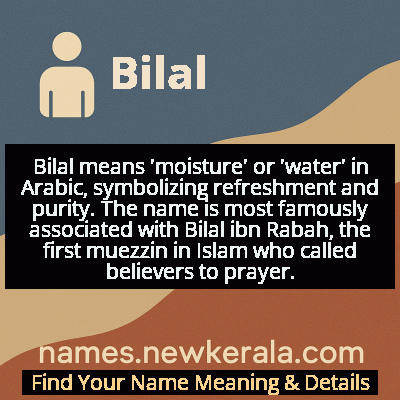Bilal Name Meaning & Details
Origin, Popularity, Numerology Analysis & Name Meaning of Bilal
Discover the origin, meaning, and cultural significance of the name BILAL. Delve into its historical roots and explore the lasting impact it has had on communities and traditions.
Name
Bilal
Gender
Male
Origin
Muslim
Lucky Number
9
Meaning of the Name - Bilal
Bilal means 'moisture' or 'water' in Arabic, symbolizing refreshment and purity. The name is most famously associated with Bilal ibn Rabah, the first muezzin in Islam who called believers to prayer.
Bilal - Complete Numerology Analysis
Your Numerology Number
Based on Pythagorean Numerology System
Ruling Planet
Mars
Positive Nature
Generous, passionate, energetic, and humanitarian.
Negative Traits
Impulsive, impatient, moody, and can be overly emotional.
Lucky Colours
Red, maroon, scarlet.
Lucky Days
Tuesday.
Lucky Stones
Red coral, garnet.
Harmony Numbers
1, 2, 3, 6.
Best Suited Professions
Military, sports, philanthropy, leadership roles.
What People Like About You
Courage, energy, leadership, generosity.
Famous People Named Bilal
Bilal ibn Rabah
Muezzin and Companion of Prophet Muhammad
First muezzin in Islam and symbol of faith under persecution
Bilal Philips
Islamic Scholar
Founder of Islamic Online University and global Islamic educator
Bilal Hassani
Singer
Represented France in Eurovision 2019 and LGBTQ+ activist
Bilal Powell
Football Player
NFL running back for New York Jets (2011-2018)
Name Variations & International Equivalents
Click on blue names to explore their detailed meanings. Gray names with will be available soon.
Cultural & Historical Significance
Throughout Muslim history, Bilal has represented the triumph of faith over oppression and the Islamic principle that piety, not lineage or race, determines one's worth before God. His story continues to inspire Muslims worldwide as an example of steadfastness and the transformative power of faith. The name carries with it the legacy of someone who stood firm in his beliefs despite extreme hardship, making it a popular choice for parents who wish to instill values of courage, faith, and perseverance in their children.
Extended Personality Analysis
Individuals named Bilal are often perceived as having strong moral convictions and unwavering principles, reflecting the historical Bilal's steadfastness in faith. They tend to be resilient in facing challenges, possessing an inner strength that helps them overcome obstacles. Many Bilals exhibit excellent communication skills and a calming presence, perhaps echoing the muezzin's role in calling people to prayer with a beautiful, reassuring voice. They are typically community-oriented, valuing relationships and often taking on roles that serve others.
The name carries an expectation of integrity and reliability, with many Bilals developing a strong sense of social justice and fairness. Their personality often blends traditional values with modern adaptability, making them respected in both conservative and progressive circles. Bilals are often seen as bridges between different groups, capable of understanding multiple perspectives while maintaining their core values. They tend to be thoughtful speakers who choose their words carefully, reflecting the significance of the spoken word in their namesake's legacy.
Modern Usage & Popularity
Bilal remains a popular name in Muslim communities worldwide, maintaining consistent usage across generations. It's particularly common in South Asia, the Middle East, Africa, and among Muslim diaspora communities in Europe and North America. The name has seen steady popularity without dramatic fluctuations, reflecting its timeless appeal. In recent years, it has gained some crossover appeal beyond Muslim communities, particularly through figures like French singer Bilal Hassani. Modern Bilals often balance traditional Islamic values with contemporary global citizenship, with the name being equally at home in religious settings and modern professional environments. Its pronunciation is generally accessible across languages, contributing to its enduring international appeal.
Symbolic & Spiritual Meanings
Symbolically, Bilal represents the refreshment and purity of water, connecting to its literal meaning of 'moisture.' More profoundly, it symbolizes the voice of faith calling people to spiritual awakening, much like the muezzin's call to prayer. The name embodies the triumph of faith over adversity, representing resilience in the face of persecution. It also carries strong symbolism of racial and social equality, as Bilal ibn Rabah's story demonstrates Islam's rejection of discrimination. The name signifies a bridge between tradition and modernity, between different cultures and races, making it a powerful symbol of unity and the universal message of faith that transcends all human-made boundaries.

